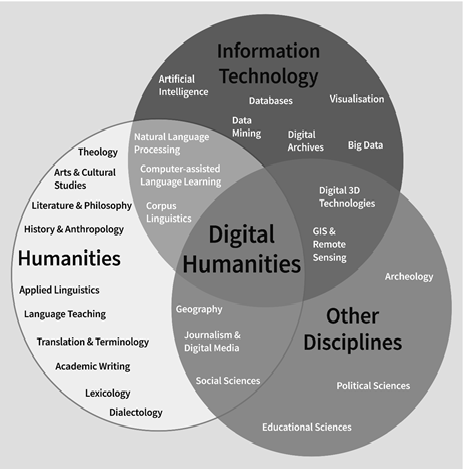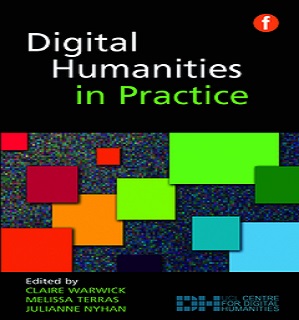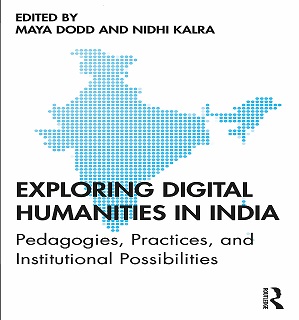
M Madhan
- Library Director
- madhan@jgu.edu.in
- 130 1845
Digital Humanities (DH) is an intellectual activity that integrates computational technology with humanities disciplines. DH is characterized as innovative approaches to scholarship that include collaborative, transdisciplinary, and computationally involved research, teaching, and publication. DH is an innovative method to study that merges conventional humanities with digital technology to produce different avenues in research, teaching, and publication. The Humanities in and for a digital age. One can say DH is the digital alter-ego of inter-cultural studies. It is not just about “Humanities” or the “Digital” rather its a composite approach.
- DH: First Wave
- Digitization/ Preservation
- DH: Second Wave
- Interpretive Research/ Digital Toolkits
- DH: Third Wave
- Interactive Digital media AR & VR, AI and Data Stewardship
DH is an emerging field of intellectual endeavor with its own professional practices, rigorous standard and exciting theoretical exploration. –Hayles, 2011
“Digital Humanities is born of the encounter between traditional Humanities and computational method” –Anne Burdick
DH is less a unified than an array of convergent practices that explore a universe in which print is no longer the primary medium in which knowledge is produced & disseminate. –Dig. Humanities Manifesto

Source: Chitez, M., Rogobete, R., & Foitoş, A. (2020). Digital humanities as an incentive for digitalisation strategies in Eastern European HEIs: A case study of Romania. In European higher education area: Challenges for a new decade (pp. 545–564). Cham: Springer International Publishing.
https://link.springer.com/chapter/10.1007/978-3-030-56316-5_34

M Madhan
- Library Director
- madhan@jgu.edu.in
- 130 1845
- Digital is one way of working across the boundaries to do things that none of us could do before.
- Most of the humanities research scholars were submitting artworks in a digital form whereas most of the outputs in science subjects were in the traditional form of peer-reviewed journal articles. So humanities researchers are leading the way in producing scholarship in a digital form.
2.Do Digital Humanists Need to Understand Algorithms?
3.Why Are the Digital Humanities So White?
4.Archaeology, the Digital Humanities, and the “Big Tent”
5.Toward a Cultural Critique of Digital Humanities
6.Borders in Digital Humanities and Library and Information Studies
7. New Data? The Role of Statistics in DH
8.A Conversation on Digital Art History

M Madhan
- Library Director
- madhan@jgu.edu.in
- 130 1845

The map represents various DH activities of the few universities and colleges from the south, north, east and west parts of the country (Pic upto 2021 Link: Journal article).
Source: Menon, N. (2020). Infrastructure and Social Interaction: Situated Research Practices in Digital Humanities in India. DHQ: Digital Humanities Quarterly, 14(3).
History
In India, the course was taught in a few graduate institutes, and Bengaluru’s Srishti Institute of Art, Design and Technology offers an MDes programme. Jadavpur University (JU), Kolkata, was the first to start the course from 2013 and offers a PG diploma. Pune University started a certificate course from 2015. IIIT Bangalore also started M.Sc in Digital Society programme in 2015. Koti Women’s College, Hyderabad, started a course from 2016 offering a BA in computer applications-digital humanities. First digital humanities PhD programme started by IIT Indore in 2018. Later other institutions started post-graduate and PhD programme.

M Madhan
- Library Director
- madhan@jgu.edu.in
- 130 1845
- Center for Digital Humanities, Pune (winter school 2018)
- Winter Institute in Digital Humanities at IIT Gandhinagar, 2019
- Digital Humanities and Cultural, School of Cultural Texts & Records Jadavpur University
- Computational Humanities Ravenshew University
- Diploma in Digital Humanities, University of Mumbai
- Certificate in Digital Humanities, Jamia Millia Islamia
- Diploma in e-Governance Digital University Kerala
- M.Sc. in DH at IIT Jodhpur
- M.Sc.in Digital Society IIIT Bangalore
- M. S. by (Research) in DH at IIT Indore
- M.Tech. in Social Media & Culture at IIT(ISM) Dhanbad (Stopped)
She was the first person who established DH prost-graduate programme in India at Shristi School of Arts. She is an independent design researcher, and founder of feminist design collective, Design Beku.
Dr. Nirmala Menon
She is a Professor in HSS school at IIT Indore. Her works extensively cover on digital scholarship & publishing and postcolonial literary theory.
Dr. Dibyadyuti Roy
He is a Lecturer in Cultural Studies, Media Studies, and Digital Humanities at University fo Leeds.His research interests on data-driven research and teaching interventions in Digital Media and Culture. He is the current Vice-President and founding member of DHARTI innovation (first Digital Humanities collective in India).

M Madhan
- Library Director
- madhan@jgu.edu.in
- 130 1845
Risam, R., & Gairola, R. K. (2019). South Asian digital humanities then and now. South Asian Review. [Download]
Murray, P. R., & Hand, C. (2015). Making culture: Locating the digital humanities in India. Visible Language, 49(3). [Download]
Murray, P. R., & Squires, C. (2013). The digital publishing communications circuit. Book 2.0, 3(1), 3-23. [Download]
Chaudhuri, S. (Ed.). (2016). Bichitra: The Making of an Online Tagore Variorum. Springer. [Link, Request a copy for Library]
Dodd, M., & Kalra, N. (Eds.). (2020). Exploring Digital Humanities in India: Pedagogies, Practices, and Institutional Possibilities. Taylor & Francis. [Link, Request a copy for Library]
Reports
Cambridge Data School:
It is an intensive, course with the overarching goal of democratising access to tools and techniques for gathering, analysing, and reporting digital data as well as promoting the growth of ethical digital research practices.
Data Camp
It is an open source platform to learn basic to advanced level Python, R, SQL and others programming languages. All online and self-paced classes.
#dariahTeach: Open source community-driven multilingual platform which provides high-quality teaching and training resources for the digital arts and humanities.
Digital Humanities Summer Institute (DHSI)
With over 60 course offerings DHSI gives the participants a chance to explore the whole swath of topics in DH and maybe more.
Digital Ocean Tutorials
Over 1500 tutorials covering areas from development to production.
Hathi Trust Research Center
Hathitrust provides access to millions of digitized books. It also Runs workshops on text mining (HATHI Research center).
Humanities Intensive Learning and Teaching (HILT)
provides a broad range of programming, web development, 3D game creation, visualisation, and text analysis courses.
Oxford Summer School
Every year July A week-long course was offered on linked data, crowdsourcing, and humanities data computing.
Programming Historian
Not only for historians! Online training for beginners and experts.
THATCamps (The Humanities and Technology Camp)
take place on a regular basis, cover a variety of themes, and include workshops that are held either before or after the conference.

- Digital Humanities Quarterly (DHQ
- Digital Scholarship in the Humanities (DSH)
- Digital Studies / Le champ numérique
- Journal of Digital Humanities (JDH) (Vols 1-3)
- Journal of Open Humanities Data (JOHD)
- Critical Inquiry
- Digital Medievalist
- 19: Interdisciplinary Studies in the Long Nineteenth Century
- Cultural Analytics
Link: DARTH
2. Standford University Projects,
Link: @standford
3. Oxford University.
Link: @Oxford
4. Kings Colleg Londons
Link: @KCL
5. Duke University Projects
Link: @Duke Based Projects
Project Madurai is an initiative to archive Tamil-language works and make them publicly accessible online. The project built a vast electronic library for Tamil Literature both old and new, from all over the world
DH Scholarship Training

M Madhan
- Library Director
- madhan@jgu.edu.in
- 130 1845
A free software tool to create chapterized audiobooks for iPod, iTunes and Quicktime.
Overview
User Guide
Calibre
A powerful and easy-to-use e-book manager
Overview
Introductory Tour
Video Tutorials
It is an “open-source tool for telling interactive, nonlinear stories”
Example: Alias 'The Magpie'

“Electronic Literature, or e-lit, refer to works with important literary aspect that take advantage to the capabilitiesand context provided by the stand alone or networked computer” - ELO
It includes text, image, sound recording, statistics table, word frequency, and information in the form of declarative statements.
Process:
A process-intensive program spends a lot of time crunching numbers
Interaction:
This is an outside caused modification to the work's condition that was intended when it was designed.
Surface:
It is a place through which audience are interact. it should be a digital display. Without a surface, no art can be seen by an audience.
Context: Context is important for interpreting any work, but digital literature calls us to consider types of context
It was created as an encyclopaedia resource on e-poetry, with concise sections that offer theoretical, poetic, and technological settings, close readings of the poems, and some approaches for readers to take to the work.
Mapping Emotions in Victorian London
A crowdsourcing project which aims to increase the scholarship options in the humanities areas. it offers anonymous participants to annotate whether certain sections from literature, mostly from the Victorian era, portrayed London in a frightening, cheerful, or unemotional way.
Strachey Love Letters
It is a literary text-generated computer programme. It will automatically generate a unique love letter for you each time you click the generator button.
VisualEyes:
It is an HTML5 web-based authoring tool which combines video, data, maps, charts, and photos to create dynamic visualizations that are engaging and highly interactive.

M Madhan
- Library Director
- madhan@jgu.edu.in
- 130 1845
A web publishing platform for sharing digital collections and creating media-rich online exhibits.
WordPress
Use to build a stunning website, blog, or application. Powerful tools, great designs, and the ability to create anything you want. At the same time, WordPress is both free and priceless..
Drupal
It is an CMS software which helps to create many types of website. Drupal offers extensive functionality and endless flexibility.
Scalar
An authoring and publishing tool that is designed to make it simple for writers to disseminate long-form, born-digital text online.
A more comprehensive list of software products available for academics and students to utilize on digital humanities projects. Curated by Alan Liu, University of California, Santa Barbara.
A Highly Opinionated Resource Guide
A curated guide to digital humanities resources created by Miram Posner for her Introduction to Digital Humanities Course (opens a new tab).
Digital-Humanities-Toolkit
A collection of free, open-source tools for generating and developing digital humanities projects, as well as related tutorials and examples of projects accomplished using those tools, would be available in a repository for the DH Community.
an interactive tool for transforming and cleaning data. The software is still in beta testing stage.
OpenRefine
It is an open source software using for data cleansing. Large data sets can be explored, data can be cleaned and transformed, and data can be matched, reconciled, and uploaded to various online services.
Trifacta Wrangler
Users of the free cloud service are able to erase up to 100 MB of data. you can use it in different formats such as Excel, CSV, JSON.
It establishes and maintains a standard for the digital representation of texts as a digital form. Libraries, museums, publishers, and independent academics strictly following the TEI Guidelines to offer texts for online study, teaching, and preservation.
Voyant Tools
It encourages critical reading and analysis of texts or corpora. It can be used to analyze online texts or ones uploaded by users.
Juxta
A tool for evaluating and compiling evidence from several witnesses to a single literary work. originally made to assist researchers and editors in tracing a text's development from manuscript to printed editions.
It is a powerful language which helps to build your project from text analysis to data visualization.
R
Integrated software facilities for data manipulation, calculation and graphical display.
Java
It facilitates the dynamic modification of parts of a web page without the need for refreshing the entire page for each change. It is not easy for humanities scholars to learn and apply their project.
Using interactive maps, connect people, places, and data. Use logical analysis techniques and clever, data-driven techniques. Share your knowledge with the world or with particular groups.
Chronos Timeline
It is specially made to analyze time-based data in the humanities and social sciences fields.
Google Data Studio
It allows users to collect data from spreadsheets, transform raw data into reports and dashboards, generate infographics, and share them with other people.
Microsoft Power BI
Microsoft's business analytics tool enables users to visualise data and incorporate the graphics into applications or websites.
Tiki-Toki
Online timeline creation tools for making stunning interactive timelines. You may construct a fully complete timeline on Tiki-Toki and share it with your friends and coworkers.
Tableau
It helps users build various infographics. To create graph visualizations and mapping, one can utilise relational databases, processing cubes, spreadsheets, and cloud databases. The public version does not support private data analysis.



